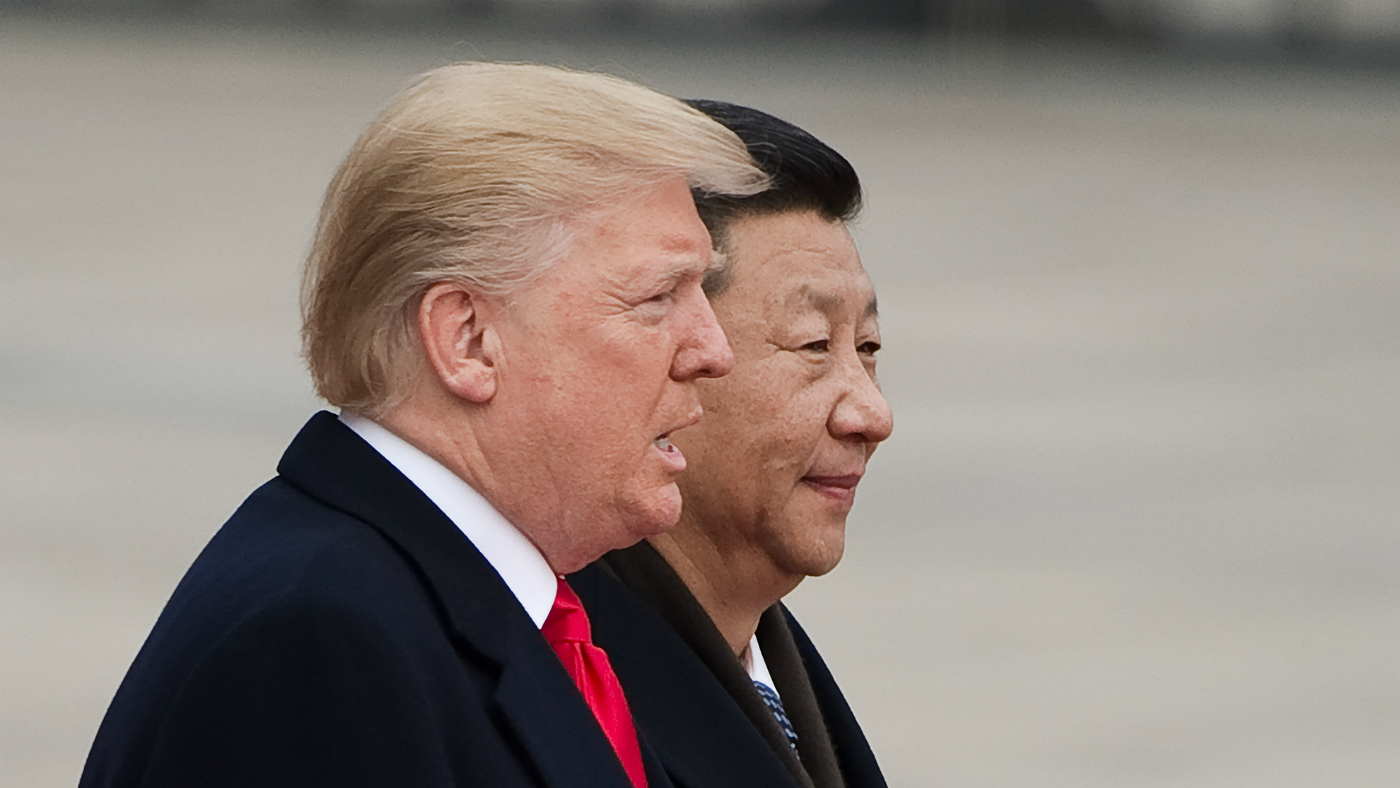Fact check: who has the most to lose in US-China trade war?
Both sides set to suffer after talks between Washington and Beijing end without a deal

A free daily email with the biggest news stories of the day – and the best features from TheWeek.com
You are now subscribed
Your newsletter sign-up was successful
Negotiations aimed at de-escalating trade tensions between the US and China have ended without a major breakthrough, as the conflict between the world’s two biggest economy escalates.
The low-level talks in Washington DC last week were the first since the US expanded tariffs on Chinese imports in June, sparking a trade war that has rattled global markets.
Both sides insisted that the two-day meeting had been broadly positive, but there was no indication that any meaningful progress had been made and no announcement of further negotiations.
The Week
Escape your echo chamber. Get the facts behind the news, plus analysis from multiple perspectives.

Sign up for The Week's Free Newsletters
From our morning news briefing to a weekly Good News Newsletter, get the best of The Week delivered directly to your inbox.
From our morning news briefing to a weekly Good News Newsletter, get the best of The Week delivered directly to your inbox.
Ahead of the talks, US President Donald Trump had said he would not be rushed into finding a solution to the dispute. “I’m like them [the Chinese],” he told Reuters. “I have a long horizon.”
With neither side willing to back down, The Week looks at who has the most to lose in the deepening trade conflict.
What has the US said and done?
Washington has imposed 25% tariffs on $50bn (£38.5bn) of Chinese imports, including a second wave of levies worth $16bn (£12.3bn) that came into effect during last week’s negotiations.
A free daily email with the biggest news stories of the day – and the best features from TheWeek.com
The US is also planning to slap punitive duties on a further $200bn (£153.7bn) of Chinese products as soon as next month, and has threatened to eventually impose tariffs on all Chinese imports if Beijing does not agree to its demands.
Commerce Secretary Wilbur Ross has insisted that the US has a stronger hand than the Chinese in the dispute.
“We are the ones in the deficit position,” Ross said earlier this year, referring to China’s $375bn (£288.2bn) trade surplus with the US in 2017. “That means they have more to lose at the end of the day than we do.”
Earlier this month, President Trump said the fall in China’s stock market this year is evidence that his tariffs are having the desired impact and that the US is winning the trade war.
“Tariffs are working far better than anyone ever anticipated,” he tweeted. “China market has dropped 27% in last 4months, and they are talking to us. Our market is stronger than ever, and will go up dramatically when these horrible Trade Deals are successfully renegotiated. America First...”
What about China?
Beijing has responded in kind to all US tariffs to date, imposing $50bn in duties on American imports.
However, it has stopped matching future threats on a dollar-for-dollar basis, vowing to introduce tariffs on just $60bn (£46.1bn) of US goods if Trump delivers on his threat to slap duties on a further $200bn of Chinese products.
Finance Minister Liu Kun said China will continue to retaliate if further tariffs are imposed.
“China doesn’t wish to engage in a trade war, but we will resolutely respond to the unreasonable measures taken by the United States,” he told Reuters last week. “If the United States persists with these measures, we will correspondingly take action to protect our interests.”
Liu added that the impact of the trade dispute on the Chinese economy had not been significant so far, but that government spending would be increased to support workers affected by the tariffs.
What are the facts?
Exports: China is unable to match US tariffs on a dollar-for-dollar basis, because it exports far more to the US than it imports from the rival country.
In 2017, China sold more than $500bn (£384.2bn) worth of goods to the US. By contrast, the US sold just $130bn (£101.4bn) to the Chinese.
Recent analysis by The Conference Board, a New York-based corporate think tank, found that US value-added exports to China were equivalent to 0.7% of economic outputs. China’s value-added exports to the US were equivalent to roughly 3% of its gross domestic product, the Financial Times reports.
The trade surplus suggests that China has far more to lose economically, but that doesn’t mean Beijing does not have the capacity to retaliate.
“China will soon run out of imports from the US to tax given the massive disparity between each country’s exports,” says Wang Xiangwei, former editor-in-chief of the South China Morning Post (SCMP).
“[This] may force China to resort to other extreme measures to counter-attack,” he adds.
Such measures could include penalising US companies operating in China, by increasing red tape, tightening foreign ownership limits and forcing profits earned in China to stay in China, according to experts.
Markets: It is too early for damage from tariffs to show up in much economic data, but the financial markets offer clues as to who investors think has the most to lose.
The Shanghai Composite Index, the benchmark used to gauge the health of the Chinese economy, has dropped by around 16% since the beginning of the year, when the opening shot was fired in the trade row.
The US Dow Jones Industrial Average has fared much better, making a 5% gain since January.
As concerns over trade policy continue to be the primary driver of market activity, “investors seem to think the US has the upper hand”, Bloomberg reports.
Politics: Experts agree that Trump has the most to lose politically, as China’s President Xi Jinping will not be punished at the ballot box if and when US tariffs begin to harm ordinary people.
“Unlike Trump who has a hostile media, a divided Congress, and voters to answer for, Beijing has none of the constraints and can mobilise its massive political machine to mitigate and prepare for a protracted war,” says Wang in the SCMP.
Earlier this year, China’s parliament passed a landmark constitutional amendment repealing presidential term limits, paving the way for Xi to rule indefinitely.
“Trump doesn’t have it so easy,” says The Washington Post economics correspondent Heather Long. “He’s already getting phone calls from Republican lawmakers who are angry at what he’s doing with the tariffs.”
Long says there is “a strong case” that the US president would be less able to sustain a protracted conflict than the Chinese, especially with the 2018 midterm elections approaching.
So, who has the most to lose?
The evidence suggests that China has more to lose economically, given that it exports nearly four times the value of goods to the US. However, unless a solution is found soon, the trade war is likely to hurt Trump the most politically.
-
 The broken water companies failing England and Wales
The broken water companies failing England and WalesExplainer With rising bills, deteriorating river health and a lack of investment, regulators face an uphill battle to stabilise the industry
-
 A thrilling foodie city in northern Japan
A thrilling foodie city in northern JapanThe Week Recommends The food scene here is ‘unspoilt’ and ‘fun’
-
 Are AI bots conspiring against us?
Are AI bots conspiring against us?Talking Point Moltbook, the AI social network where humans are banned, may be the tip of the iceberg
-
 Currencies: Why Trump wants a weak dollar
Currencies: Why Trump wants a weak dollarFeature The dollar has fallen 12% since Trump took office
-
 TikTok: New owners, same risks
TikTok: New owners, same risksFeature What are Larry Ellison’s plans for TikTok US?
-
 Trump wants a weaker dollar, but economists aren’t so sure
Trump wants a weaker dollar, but economists aren’t so sureTalking Points A weaker dollar can make imports more expensive but also boost gold
-
 Leadership: A conspicuous silence from CEOs
Leadership: A conspicuous silence from CEOsFeature CEOs were more vocal during Trump’s first term
-
 The end for central bank independence?
The end for central bank independence?The Explainer Trump’s war on the US Federal Reserve comes at a moment of global weakening in central bank authority
-
 Can Trump make single-family homes affordable by banning big investors?
Can Trump make single-family homes affordable by banning big investors?Talking Points Wall Street takes the blame
-
 Phish food for thought: Ben & Jerry’s political turmoil
Phish food for thought: Ben & Jerry’s political turmoilIn the Spotlight War of words over brand activism threatens to ‘overshadow’ the big ice cream deal
-
 What a rising gold price says about the global economy
What a rising gold price says about the global economyThe Explainer Institutions, central banks and speculators drive record surge amid ‘loss of trust’ in bond markets and US dollar